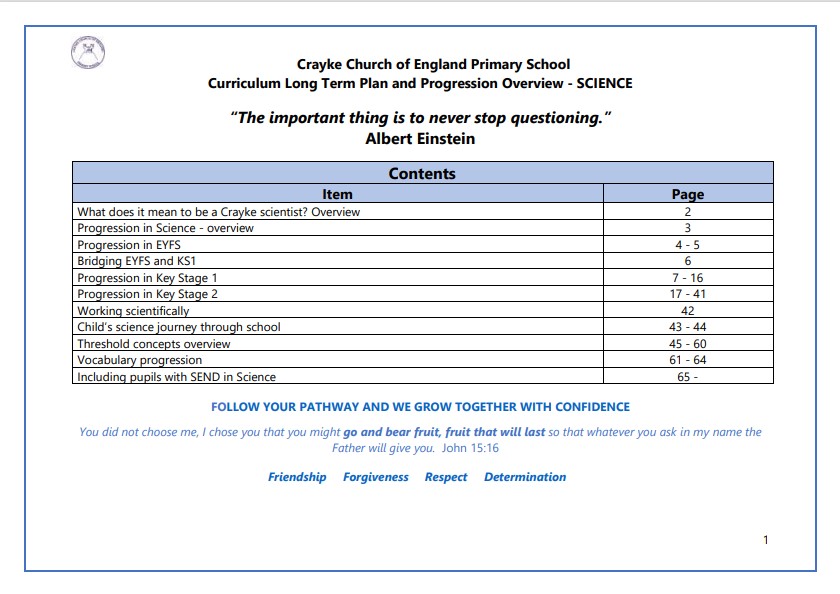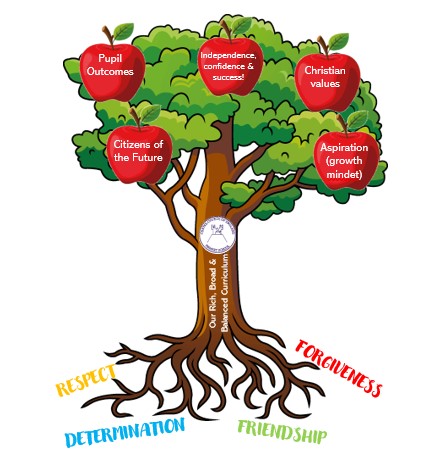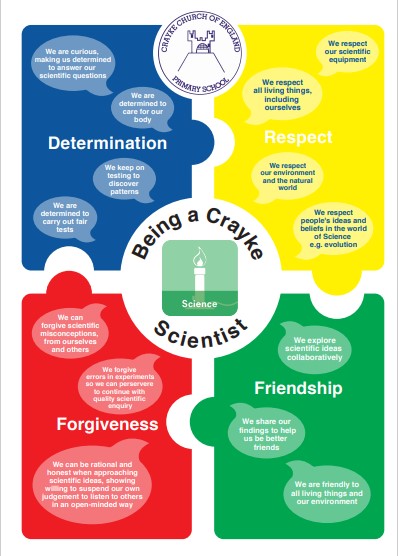
This page provides details about what Science looks like at Crayke Primary. It includes our Intent Statement, our coverage and progression document and our “jigsaw” explaining how teaching and learning in Science links to our four core values of Friendship, Forgiveness, Respect and Determination.
The Science Subject Leader is: Mrs Dobson.
Details relating to Coverage and Progression in this subject can be found here:

Science NC Programme of Study

Ensuring access to a rich, broad and balanced curriculum, based upon and framed by our school values of Respect, Determination, Friendship and Forgiveness, is at the heart of Crayke’s provision…
Rationale: The fundamental aim of Crayke Church of England Primary School is to provide opportunities for children to develop as independent, confident, successful learners with high aspirations; creating citizens of the future who know how to make a positive contribution to their community and the wider society. This aligns with our school vision which strives to enable children to “Follow your pathway and grow together with confidence.”

Science intent:
Being a Crayke Scientist means that pupils learn:
- The ability to think independently and raise questions about working scientifically and the knowledge and skills that it brings.
- Confidence and competence in the full range of practical skills, taking the initiative in, for example, planning and carrying out scientific investigations.
- Excellent scientific knowledge and understanding which is demonstrated in written and verbal explanations, solving challenging problems and reporting scientific findings.
- High levels of originality, imagination or innovation in the application of skills.
- The ability to undertake practical work in a variety of contexts, including fieldwork.
- A passion for science and its application in past, present and future technologies.

Meeting National Curriculum requirements, we deliver a rich, broad and balanced curriculum. Crayke engages all learning styles using a variety of resources which support the teaching of the curriculum. The wider learning culture is promoted through our school values of ‘Determination, Respect, Friendship and Forgiveness’ and through a culture of our aspirational ‘Crayke Growth Mindset’.
EYFS:
The EYFS Curriculum for Understanding the World is taught in a variety of ways through adult-led and adult-supported tasks and child initiated learning in well resourced provision areas, both indoors and outdoors.
KS1 & KS2:
Using the National Curriculum and the Essentials Curriculum (see attached), we follow a rolling 2 year programme (Year A and Year B) This ensures that all key topics are covered and supports the progression of skills across our mixed age classes.
Our curriculum is built through a thematic approach which makes connections in skills and knowledge.
Where appropriate, we block learning in order to immerse children fully. Where relevant and possible, we offer enrichment activities to motivate, excite and inspire pupils in the form of ‘Stunning Starts’, ‘Marvellous Middles’ and ‘Fabulous Finishes’ – these may take the form of educational visits, visitors, theme days, achievement assemblies, exhibitions etc.
We link our learning to key texts that will enrich language and provide context to learning; our units are learning challenges based around a ‘big question’ as a starting point e.g. ‘How do wild animals live?’ We follow our lesson structure, (see attached) making connections and spotting values through our Science lessons.
Creatively produced Science books give children a sense of pride in the presentation of their work.
Science impact:
Impact will be measured by assessing against the Essentials Curriculum milestones statements through ‘Insight pupil tracking’ as:
- Below
- Just below
- On track
Crayke Scientists will be able to demonstrate the essential characteristics of scientists detailed in the Intent section above.
They will successfully be able to:
- Work Scientifically
- Understand Humans, Plants and Animals
- Explain Evolution and Inheritance
- Understand Forces, Magnets and Movement, including the movement of Earth in space
- Investigate Materials and Living Things
- Describe Light, Sound and Electrical Currents
They will use the school Christian values of Respect, Determination, Friendship and Forgiveness to drive their Science attainment and show progress against the Essentials milestones alongside demonstrating aspiration, confidence, independence as they develop in to citizens of the future.








